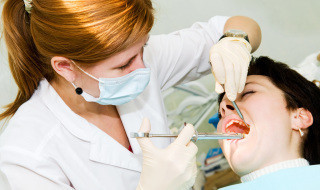 Fiona Sandom, a postgraduate tutor at Cardiff University, dental therapist in North Wales Community Dental Services and new president of the British Association of Therapists (BADT), took over the role from outgoing president Bal Chana at the association’s annual conference that took place in Manchester last month (September).
Fiona Sandom, a postgraduate tutor at Cardiff University, dental therapist in North Wales Community Dental Services and new president of the British Association of Therapists (BADT), took over the role from outgoing president Bal Chana at the association’s annual conference that took place in Manchester last month (September).
Fiona is pledging to work towards changing the ‘unfair’ status quo on prescribing rights for dental therapists.
It comes as physiotherapists were granted powers to prescribe (a restricted list of) medicines under new laws coming into force in Wales, Fiona’s home country.
Fiona explained: ‘It’s unfair and hampers our work greatly, since we are unable to carry out the full scope of our practice and whilst some of our places of work have Patient Group Directions (PGDs) in place, they are still extremely limiting.’
The change – also applying to chiropodists and podiatrists – is aimed at easing the pressure on these areas of the NHS.
Nurses, pharmacists and optometrists can already prescribe certain medicines, with powers now extended to additional groups of health professionals, subject to training.
Fiona is already in negotiations with the chief dental officers in the BADT’s bid towards changing prescription rights for therapists.
Fiona explained: ‘As president, I want to make a difference to the way we care for patients properly and increase their access to dental care.
‘We are aware of the discrepancy over the access to dental care, especially in rural and deprived areas.
‘As dental therapists, we are able to help the profession deliver preventative – as well as restorative – care and with prescribing rights, we can contribute to improving the oral health in Britain, while working to our full scope of practice.’
A PGD is a written instruction allowing listed healthcare professionals to sell, supply or administer named medicines in an identified clinical situation, without the need for a written, patient-specific prescription from an approved prescriber.
The Human Medicines Regulations 2012 require that both a dentist and a pharmacist must sign a PGD.
For practices providing NHS primary dental services, the PGD must also be signed on behalf of the commissioning body.
For private dental practices in England and registered with the CQC (Care Quality Commission), the PGD must be signed by a dentist and a pharmacist and by or on behalf of the registered provider and, if there is a relevant manager for the practice or clinic, by that manager.
For private practices in Wales, the PGD must be signed by the private dentist who is treating the person, a pharmacist and, if there is a manager for the practice or clinic, by that manager.


